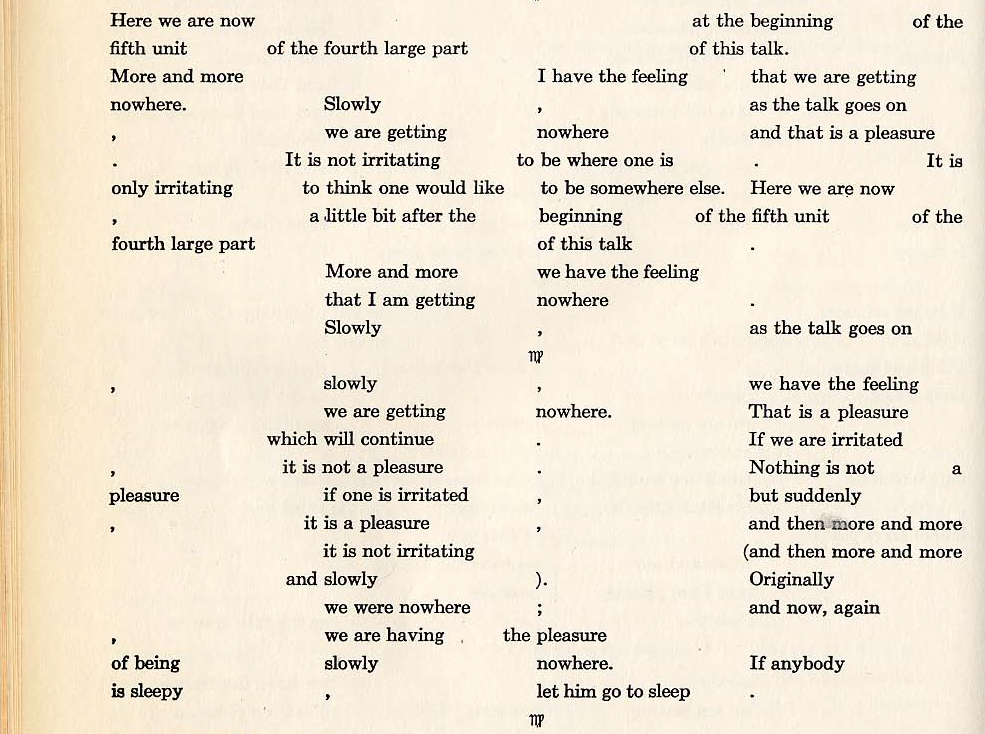
Thoreau lived not two hundred years ago but forty-four years only beginning one hundred and fifty-nine years ago. Those excerpts which are used were not selected to stress any particular points, but were obtained by means of I Ching chance operations from Walden, from the Journal, and from the Essay on Civil Disobedience. Therefore, even though the occasion for this piece is the bicentennial of the U.S.A., I have chosen to work again with the writings of Henry David Thoreau. We could regain it tomorrow by simply changing our minds. Money, however, is credit, and credit is confidence. Our leaders are concerned with inflation and insufficient cash. It would be more in the spirit of Yankee ingenuity, more American, to find a way to get all the work done that needs to be done without anyone’s lifting a finger. Our leaders promise they will solve the unemployment problem: they will give everyone a job. Not only will earth’s reservoir of fossil fuels soon be exhausted: their continued use continues the ruin of the environment. They assure us they will find new sources of oil. Our leaders are concerned with the energy crisis. That is why not only aspiration but intelligence (as in the work of Buckminster Fuller) and conscience (as in the thought of Thoreau) are missing in our leadership. When the law is corrupt, it is corrupt because it concentrates its energy on protecting the rich from the poor. It is concerned with precedent, not with discovery, with what was witnessed at one time in one place, and not with vision and intuition. Of all professions the law is the least concerned with aspiration. I began to realize that what is called balance between the branches of our government is not balance at all: all the branches of our government are occupied by lawyers. It is a collection of legal judgments, presidential reports, congressional speeches. The thickest one was edited by Commager (Documents of American History). I found that anthologies for children are written by adults: they are what adults think are good for children. The man who answered said: “You may think I’m not serious, but I am if you’re interested in aspiration, go to the Children’s Library on 52nd Street. I called the information desk at the New York Public Library on 42nd Street. I called a part of Columbia University concerned with American history and asked about aspirational thought. I called up Dover and asked whether they published such an anthology. I thought the resultant complex would help to change our present intellectual climate. The first thing I thought of doing in relation to this work was to find an anthology of American aspirational thought and subject it to chance operations. PREFACE to Lecture on the Weather by John Cage ”Lecture on the Weather” was chosen for inclusion at the commemorative 2007 concerts celebrating the placement of the John Cage Trust at Bard College, hosting an all-star cast: John Ashbery, Ralph Benko, Leon Botstein, Sage Cowles, Merce Cunningham, Jasper Johns, John Kelly, Garry Kvistad, Joan Retallack, Mikel Rouse, John Ralston Saul, Richard Teitelbaum, and a select number of extremely talented students from Bard’s Conservatory of Music and Music Program. The drawings upon each staff are arranged in the 5-7-5 structure of a Haiku poem, and each line is a Haiku. The score was composed by means of placing Thoreau drawings from his journal and other sources upon twelve lines of music staves which serve as graphic notation for the musicians. “Lecture on the Weather” produced by Laura Kuhn and Electronic Music Foundation, Saturday, Octopresented by The Project Room for New Media and Performing Arts at Chelsea Art Museum, NYC, curator Nina Colosi.

The work combines texts with music, projected images, lighting, and a weather soundscape - forming a softly political piece as relevant today as the year it was written. It was to be performed, according to Cage, by 12 men, “preferably American men who have become Canadian citizens.” Lightning, in the form of white shapes from Thoreau’s workbooks, flashes on screens surrounding the audience. Following the prelude, the readers recite excerpts from Henry David Thoreau’s writings – his Journal, “Walden: Life in the Woods”, and “On Civil Disobedience”, selected by means of I Ching chance operations – while a gathering storm emerges. Cage set the tone for “Lecture on the Weather” (1976) in a recorded preface (transcript below) as he stated his political, social, and environmental concerns regarding the direction the country was taking.ĭuring the prelude, twelve readers gradually take their seats in two rows back-to-back. Commissioned by the Canadian Broadcasting Corporation in Observance of the BiCentennial of the United States of America, 1976.


 0 kommentar(er)
0 kommentar(er)
